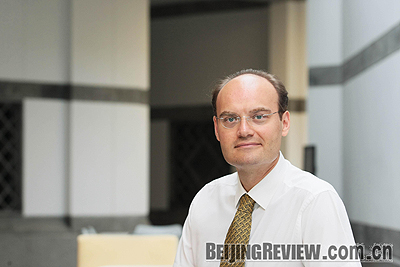By David Gosset
For European leaders, developing a strategic vision for the EU and China is a much better choice than indulging in demagogy
The ability to consider the big picture and develop a strategic vision for the long term defines genuine leadership. In the current phase of tension between the European Union (EU) and China over the Tibetan issue, the EU shows again that it is in need of real leadership.

|
|
COURTESY OF DAVID GOSSET [Beijing Review]
|
This year, on three different but highly significant occasions, Beijing has proved that it is a cooperative and responsible member of the international community. The Olympic Games were, in the words of Jacques Rogge, President of the International Olympic Committee, "truly exceptional." After the crisis in Georgia, Moscow did not succeed in winning Beijing to its side in recognizing Abkhazia and South Ossetia, and Beijing avoided a sterile antagonism between the West and a Sino-Russian axis. Last but not least, during the recent financial turmoil, China has been a key stabilizing force. Despite China's constructive and balanced behavior, the EU ends 2008 with an unnecessary quarrel with one of the main pillars of the 21st century global order.
By officially displaying strong support for the Dalai Lama, some European politicians want to believe they are doing the right thing. They are, in fact, demonstrating shortsightedness, ignorance and, to a certain extent, irresponsibility.
In a midst of a complex financial and economic crisis that calls for more Sino-European synergy and global coordination, some myopic officials are taking the EU further away from the positive dynamics of the Chinese renaissance, arguably the most significant story of our time.
At the end of 2007, French President Nicolas Sarkozy told Xinhua, the Chinese news agency, "My ambition is to make 2008 a great Euro-Chinese year." It would have been highly relevant since it was exactly 30 years ago that Beijing adopted the policies of reform and opening up, putting one fifth of mankind on the road to relative prosperity and progress. Instead, 2008 ends with a crisis between the EU and China. In sharp contrast, the fifth round of the Strategic Economic Dialogue between Washington and Beijing has produced constructive outcomes.

|
|
AMBITION FAILED: French President Nicolas Sarkozy said his ambition was to make 2008 a great Euro-Chinese Year, but the year ends instead with a crisis between the two sides. [Beijing Review]
|
The events immediately leading to the dispute between Brussels and Beijing are well known. In March, the French Government chose to lead the protest against what it framed as China's "crackdown" in Tibet. Bernard Kouchner, the French Minister of Foreign Affairs, declared that the EU should consider boycotting the opening ceremony of the Olympic Games. In April, the disruption of the Olympic torch relay in Paris sparked a boycott of French products by the Chinese people. On November 13, President Sarkozy, who also holds the rotating presidency of the EU, announced a meeting with the Dalai Lama in Poland on the occasion of the 25th anniversary of Lech Walesa's Nobel Peace Prize. Thirteen days later, Beijing postponed the 11th EU-China Summit scheduled for December 1 in the French city of Lyons.
Beijing's decision is not the product of impulsive haste but the result of internal discussion, careful political consideration and geopolitical calculation. It is also an expression of China's strength and confidence. Beijing cannot passively observe developments that threaten its territorial integrity and undermine its social stability. European capitals cannot feign surprise at such a rational approach and have to expect from Beijing resolute and proportionate response to any external provocation. On this issue, the Chinese Government can rely on massive backing by the Chinese population. An online survey that drew more than 63,000 votes showed that about 97 percent of netizens reacted with indignation to Sarkozy's meeting with the Dalai Lama.